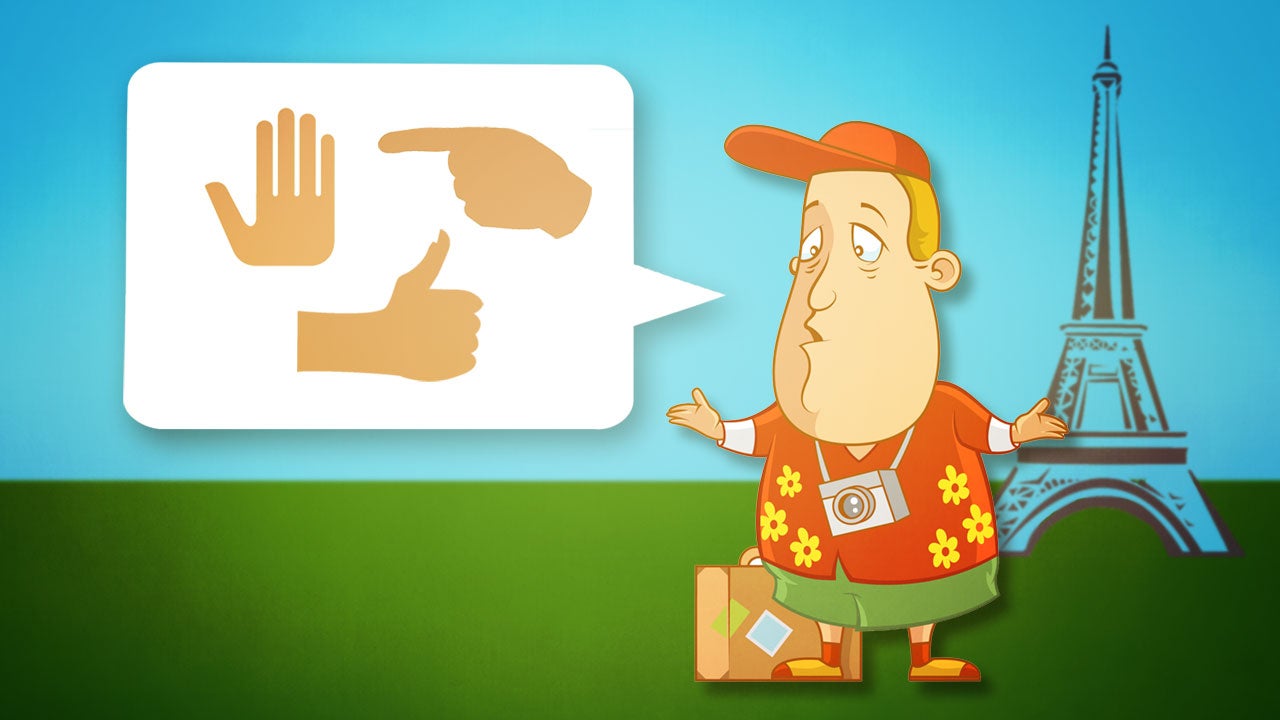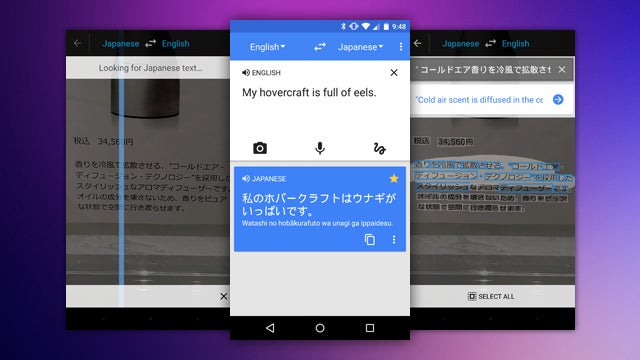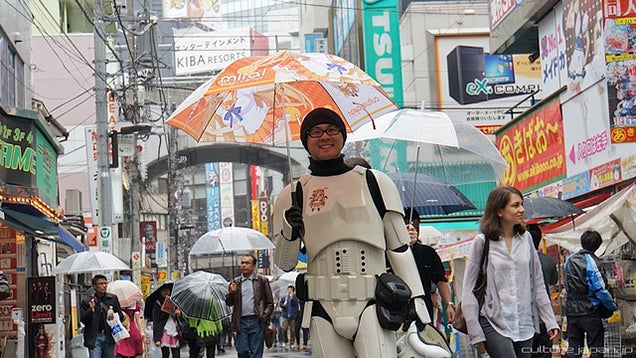How to Visit a Country Without Speaking the Language
How to Visit a Country Without Speaking the Language

Traveling should be an exciting adventure – a lack of knowledge of the local language shouldn’t fill you with dread.
You may not have time to understand the customs and speech of an entire country before you go, but following the tips below should be enough to get you through your visit.
Think Before You Try to Speak
Politeness generally transcends any language.
While feeling overwhelmed by a foreign language can be frustrating, treating others with respect and care will likely be more valuable than any app or guide book.
- Don’t get upset with someone if they don’t understand you. A server might struggle to register your broken request for a soda. A helpful stranger may also have a hard time getting an idea of what you’re asking to give directions. Even if you’re getting frustrated, think about how it feels to be on the other side of the encounter.
- Consider what you can do to get your point across and have fun with it. As Travel Made Simple shares, “Hand gestures and miming work well. When trying to order food, if you can’t tell what kind of meat something is, moo like a cow, flap your arms like a chicken, swim like a fish.” Yes, you might look ridiculous in this process, but it also makes you much more likely to be understood.
- Follow the customs. For people in several Balkan countries shaking your head means “yes” and nodding it means “no.” In Russia, smiling at strangers is not the norm and won’t be the friendly sign you mean it to be.
Know Before You Go
Planning ahead is usually a smart idea when it comes to traveling, and it’s doubly important to do so with a language barrier.
- Learn basic words and phrases, especially those which will make common courtesy a little easier. “Thank you,” “please,” “excuse me” and “sorry” are great places to start. Even those simple terms will save you time and worry so you don’t have to stop and look them up when you want to thank a helpful guide or apologize for bumping into someone at a shopping center. Simple phrases to do with English, directions and other similar needs could also be useful.
- Consider navigation needs before you travel. Think carefully about whether the GPS on your phone will suffice or if you need a separate device. If you’re expecting a weak internet connection or not traveling with a guide, other options are needed. A physical map can be a good idea, plus it doesn’t take up a lot of space.
- Do your research on your destination. Talk to any friends or family who have been there and look up plenty of details about places you want to visit. This can tell you about available English tours, the best locations for foreigners and more.
Try to Translate
Of course, all the preparation and politeness in the world may not be enough to get you from one place to another. Translations can come in many forms.
- Apps are a modern game-changer for people who don’t speak the same language. Every resource will have its quirks so you shouldn’t rely on any for precise translations. Although, even with some technological hiccups, apps and help from the internet can be invaluable. In a pinch, those resources can give you a fast way to at least understand the gist of the situation. You can input what you want to say, translate a sign or work on your pronunciation before you go to bed.
- Find people who want to help. A hotel concierge, for example, is a fountain of knowledge and their job is to assist guests. Trip Advisor also suggests looking for locals who’d like the opportunity to practice their English, such as students at a university.
- Carry a pen and paper. Writing or drawing may seem old-fashioned, but it’s a strong method of communication when miming or translator apps aren’t working. You can write numbers, draw pictures of what you need, make up a map, and more. The tools can also be easily given to someone else – rather than handing over your phone all the time, you can give your taxi driver the information that a newfound friend gave you by tearing off a sheet of paper.
Bonne chance (good luck)!
Have you ever tried to go to another country without speaking the language? Were our tips helpful? Let us know in the comments below, or via Facebook and Twitter.
Written for Passport Health by Katherine Meikle. Katherine is a freelance writer and proud first-generation British-American living in Florida, where she was born and raised. She has a passion for travel and a love of writing, which go hand-in-hand.
About Us
Passport Health’s blog provides travelers and travel enthusiasts with a variety of news and features. We focus on bringing the most interesting and relevant stories right to our readers. Topics range from the vaccines needed for a destination to updates on recent outbreaks, travel advice and much more. Feel free to check out some of our most popular posts, linked in the sidebar, or our most recent posts below
How to Travel Abroad Without Knowing the Language

Photo: Deposit Photos
Can’t wait to explore the world around you? Well, that is perfectly understandable! There are many countries out there with exciting history, fascinating sights, and picturesque landscapes! Fortunately, you have plenty of opportunities now to become a traveler, such as:
● Business trips
● Exchange programs for students
● Teaching abroad
● Last-minute tours with discounts
● Hitchhiking
However, traveling is not always fun and requires thorough planning. You should also speak the language of the country you’re going to (well, at least some basic expressions). But what if you don’t? How do you avoid misunderstanding during your trip?
We have prepared some tips for you, using which you can easily overcome the language barrier!
Plan Your Trip Step-by-Step
To make your traveling experience unforgettable, you should take care of every little detail — from packing your bags to arriving back home.
While staying in a country the language of which you don’t speak, you should never lose confidence and be prepared to resolve any communication-related problems. Hence, we would like to divide our guidelines in the following way:
● What to prepare in advance?
● How to speak and behave yourself?
● Additional tips that can come in handy
Hopefully, they will help you feel more confident during your travels.
Things to consider before going abroad
Book a tour. That’s the simplest thing to do. By buying a tour, you don’t need to worry where to go, how to purchase museum tickets, or how not to get lost in an unfamiliar city.
All of these things have already been taken care of, so all you need to do is relax and enjoy yourself.

Photo: Deposit Photos
Learn some basic phrases. Learn a few fundamental words and expressions such s as “Hello,” “Thank you,” “Goodbye,” “How to get to the…”, etc. That will help you feel more confident and make communication with the locals a bit easier!
A lot of people try to handle communication problems by buying phrasebooks and carrying them around. Well, this is an option, but you shouldn’t overly rely on it.
Firstly, your pronunciation may confuse the listener and, secondly, you’ll get a reply! Imagine having to search for a translation every time you hear a word or expression you don’t understand? It’s not much fun, right?
Wr ite things down. If you want to go sightseeing, we suggest you write down the names of the places you are going to visit. It will save you the embarrassment of mispronouncing words and help your listener understand what you’re talking about.
Install useful apps . And we’re not talking about playing Subway Surfers while being on a plane or waiting for your sightseeing bus. Research a little and find apps with speech synthesis, handy dictionaries, offline maps, etc. We recommend looking for apps that work both online and offline.
How to speak?
Avoid using complex language. English is considered one of the most widely spoken languages, so there is a high probability that you will make yourself understood. However, we suggest you refrain from using fancy words and expressions — speak slowly and clearly.
Of course, if you fall in love with a local and want to write an affectionate letter in their language, you should consider using online research paper editing (they have native speakers from different countries).
Body language. Commonly used hand gestures or even onomatopoeia will help you describe what you are looking for. It will also make a communicative act more fun. But be careful not to overdo it — no one likes being near a windmill.
Useful tips for making your trip more fun
Well, this is it. You’ve got all the recommendations you need to deal with a language barrier more efficiently. As a little bonus, we’d like to provide you with some more tips that may come in handy even for experienced travelers. Take a look at them, and maybe your next journey will be even more exciting:
● Learn from others’ experiences. Go online and look for travel blogs providing information about your destination. Their authors may share their knowledge with you, suggest some must-see places, and warn about possible challenges.
● Carry a notebook with you. Can’t find a word in your dictionary? There is an unscheduled sightseeing tour, and you haven’t written down all the places on your itinerary? Draw it! Even simple images can help you reach your destination or explain your question to a local.
● Record your route. If you travel alone, be sure to film your way to the hotel and other places you visit. When you have no map with you, your photos and videos can be the best guides.
Don’t be afraid of any challenges! Have a nice journey! You can visit the author’s site for more information.
How To Get By Overseas When You Don’t Speak The Language

Unless you have a super-brain, you’re probably not going to learn a whole new language every time you visit a different country. But with the right tools in your arsenal, you can get by. Here’s how to survive when you don’t understand the native tongue.
To bridge the gap, you’ll need to rely on more than just a phrase book. Many countries and major cities that expect tourism from English speakers (which we assume you are if you’re reading this) are somewhat English-friendly, which helps — but, of course, your mileage may vary. I recently spent a week in Japan without knowing the language. Here’s what I learnt during my trip.
Some of the Most Useful Languages Are Universal

Not speaking the native language is immediately overwhelming. Everything seems alien, and your first assumption is that no one will understand anything you want to say. However, this isn’t true at all! They can often understand a lot — just not the words you use. A number of “languages” are universal.
Pointing Is More Useful Than Speaking
This is the simplest gesture that conveys the most information at once. If you want a person’s attention on an item, pointing will get you there faster than trying to say “May I please buy one of your delicious rice balls?” I ordered food at least three dozen times per hour in Japan (the food is delicious, don’t judge me) and never once had to scramble for the Japanese word for “curry”.
Pointing isn’t just for menus, either. On one occasion, we were trying to get to a particular train station and weren’t sure how to get a ticket from the machine. A helpful passerby attempted to assist us. While he didn’t speak English, I was able to point to where I wanted to go on my phone. He then pointed to a spot on a fare map that included our destination (written in Japanese, of course) as well as the fare amount. From there, we figured out that the map wasn’t just showing locations, but prices. What we thought were station numbers were actually the cost to go to different places.
We’d written off the map because we couldn’t read it, but this guy not only showed us where we needed to go, but helped us understand how the system as a whole works. We had the information, we just didn’t know where to look. Pointing was the Rosetta Stone that got us there. Of course, be sure to read up on gestures before you get there. As Smarter Travel recommends, you should make sure you know what a gesture means before using it in another country:
Hand gestures are almost universally understood. Before you start playing charades however, learn the local meanings of common gestures. In Bulgaria, for example, nodding means no, and shaking your head means yes. Yikes! Search up some local gestures beforehand to make sure you’re not insulting your waitress when trying to gesture for water.
Even if pointing is universally understood, how you point matters. Some countries accept single-finger points, while others will be offended if you don’t use the whole hand. In some cases, a four-fingered point means something different than a single finger. Be sure to check out the customs for the country you’re visiting before you travel.
Maths Is The Same in Every Language
Maths is one of the most universal languages we have. Not only does 2 + 2 = 4 everywhere on Earth, but most countries use the Hindu — Arabic numeral system (and if you understood the maths problem in this sentence, you do too). Even if you find yourself in the rare place that doesn’t use the 0-9 characters, it’s a lot easier to memorise 10 symbols for numbers than it is to learn a whole new spoken language.
Relying on numbers gets around a lot of surprisingly complex lingual problems like “a”. As in “I would like a Coke”. In English, the word “a” indicates the subject, but it also indicates the quantity: one Coke. Many languages, however, don’t have this type of quantity confirmation built in, even if you did speak it. When in doubt, just indicate a number.
Use Your GPS (and Download Offline Maps)
Not speaking a language isn’t the only problem you’ll face abroad. You also probably can’t read the signs. This gets even worse if the country you’re in doesn’t even use the same alphabet as your native language. Fortunately, GPS works everywhere (provided you have internet to download the accompanying maps).
While in Japan, I found that having GPS was the single most important tool for getting around. As soon as we landed, I used the airport Wi-Fi to look up directions to our hotel. While I lost internet for the entire journey, the directions were cached. Most of the stations weren’t in English, so we had to count stops (thanks again, maths!), and any time we walked somewhere I would check where we were against the GPS on my phone.
This is a decidedly 21st century possibility. While we were still able to navigate the subway thanks to signs that were also in English (or even the Japanese ones after the helpful passerby from earlier showed us how), we were never truly lost. Which is impressive given how large Tokyo is and how little none Japanese I know. As long as Google Maps exists in your country, it should probably be slightly higher on your packing list than a generic phrase book.
Language Translators Are Good Enough, If You Use Them Right

Apps like Google Translate get a bad rap for being slightly crap at the nuances of grammar. However, they’re actually insanely good… if you use them properly. Before I left, I downloaded the Android app and the Japanese language pack for offline translation. I anticipated using this any time someone wanted to talk to me.
As it turns out, this was a terrible idea. Sticking a phone in someone’s face every time I had a question was not intuitive and probably offensive. However, I did use it as a phrasebook. I saved phrases like “Thank you”, ” Where is the bathroom?” and “My hovercraft is full of eels” for quick reference. Eventually I was able to memorise them, but having them in an app was convenient. Of course, the usual disclaimers about accuracy still apply: for anything more complex than the absolute basics, be sure to double-check with either an actual phrase book or a native speaker. In my experience, if you could translate a phrase to Japanese, and then use the reverse translate feature on that translation and get the correct sentence back, it tended to be close enough for native speakers to understand.
More helpful, however, was the image translation. If you have internet access, you can take a picture of a piece of text and translate it into another language (or skip the picture altogether in some cases). It won’t give you an exact translation, but it’s good enough for tourist work.
This is one of those times that good enough actually is good enough. We aren’t at the point where your phone can send perfectly translated phrases to your brain, but when you don’t speak a word of a language, you can’t tell the difference between “freshly cooked salmon” and “slightly crumpled graph paper”. You’d be surprised how useful even a few words can be.
Etiquette and Courtesy Will Save You a Lot of Trouble

Here’s a useful tip: you’re going to screw up. No matter how much you try to prepare, you’re going to encounter some situation where you don’t know what to say or accidentally do something you shouldn’t. In those instances, only one thing can save you, and it’s not an app. It’s courtesy.
Courtesy helps bring out the best in the people who are there to help you, even without the language barrier. Make it a priority to learn how to say things like “I’m sorry” or “Excuse me”. When I left, I anticipated using the phrase “Where is the toilet?” and added it to my phrasebook. However, everywhere I went, either signs or common sense showed me where the bathrooms were. Yet, “Excuse me” became an everyday phrase when trying to move through crowded stores. Politely asking to be let through was way more productive than just forcing my big dumb American body through a crowd.
My group also made a point to say simple phrases like “Delicious” when at restaurants, or “Thank you“, after transactions. These are simple things that even an app can translate, but the mere fact that we said them often resulted in those we spoke to smiling and becoming more enthusiastic. Of course we had no idea what they were saying. Perhaps they thought our accents were adorably atrocious. But by making the effort and being respectful, we found more people were willing to help us find our way.
I was told before leaving that Japan typically has a courteous, respectful society by nature, so that probably didn’t hurt. However, most people, regardless of culture, generally like it when others are nice instead of jerks. Keep in mind that when you travel, you’re in someone else’s home. It may be novel to you that you finally get to see that place you saw on TV or read about on the internet, but you only have a tiny sliver of someone else’s everyday life. Go out with a bit of humility and a lot of respect, and you should do well.
Source https://www.passporthealthglobal.com/2018/07/how-to-visit-a-country-without-speaking-the-language/
Source https://www.fashiongonerogue.com/how-travel-abroad-without-language/
Source https://www.lifehacker.com.au/2015/04/how-to-get-by-in-a-foreign-country-when-you-dont-speak-the-language/